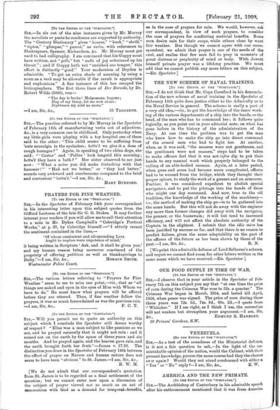THE NEW SCHEME OF NAVAL TRAINING.
[To THE EDITOR OP THE "SPECTATOR."] SIR,—I do not think that Mr. Cope Cornford in his denuncia- tion of the new scheme of naval training in the Spectator of February 14th quite does justice either to the Admiralty or to the Naval Service in general. The scheme is really a part of a very old idea,—viz., to get the knowledge of the inner work. ing of the various departments of a ship into the hands, or the head, of the man who has to command her ; it follows quite logically, as you point out in your editorial note, on what has gone before in the history of the administration of the Navy. At one time the problem was to get the man who knew how to make the ship go into direct command of the armed men who had to fight her. At another, when, as it was said, " the seamen were not gentlemen, and the gentlemen were not seamen," steps had to be taken to make officers feel that it was not infra dig. to put their hands to any manual work which properly belonged to the calling of an able-bodied seaman. Again, at a later period, when guns and arms had become more complicated, officers had to be weaned from the bridge, which they thought their proper sphere, to study the work of a gunner and an armouree Further, it was considered expedient to abolish special navigators, and to put the pilotage into the hands of those who might cue day command. And now, true to the old tradition, the knowledge of the working of the machinery- i.e., the method of making the ship go—is to be gathered into the same hands. But this will not do away with the engineer any more than former changes did away with the navigator, the gunner, or the boatswain ; it will but tend to increased efficiency, and will not affect the absolute authority of the Captain in the slightest. I submit that the idge mere has been justified by success so far, and that there is no reason to predict failure, given the same adaptability on the part of the officers of the future as has been shown by those of the [We print this admirable defence of Lord Selborne's scheme, and regret we cannot find room for other letters written in the same sense which we have received.—ED. Spectator.]










































 Previous page
Previous page